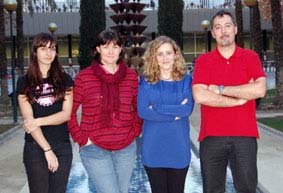
A team of researchers at the Neurobiology Unit of the University of Valencia, led by Cell Biology Professor Isabel Fariñas, publishes in Cell Stem Cell the results of a study that could shed some light into the origin of certain tumors. The study relates the tumor suppressor gene Cdkn1a(p21) with Sox2, a gene involved in cellular reprogramming and cancer.
The group has found that, in stem cells of the adult brain, it is the tumor suppressor gene Cdkn1a(p21) the one that regulates the levels of Sox2, a gene involved in cellular reprogramming and cancer. Neural stem cells require Sox2 to persist and be functional, but if Sox2 levels are too high, proliferation is affected, DNA is damaged, and stem cells become unstable. Therefore, understanding how Sox2 is regulated in adult stem cells gives clues to researchers about how to maintain these cells stable to ensure tissue renewal while preventing tumor formation. For this study, researchers at the University collaborated with scientists in London, Madrid, and Santiago de Compostela.
Another recently issue of the magazine includes a similar study led by the head of the Tumor Suppression Group at the Spanish National Cancer Research Center (CNIO) in Madrid, Manuel Serrano. According to their work, the gene Cdkn1b(p27), a relative of Cdkn1a(p21), regulates the expression of Sox2 in other tissues.
The newly discovered functional relationship between Sox2 and Cdkn1a(p21) and Cdkn1b(p27) genes could explain the origin of some lung, brain, and pituitary cancers and advances our understanding of how stem cells are maintained stable and contribute to adult tissue renewal. "To prevent genomic instability in stem cells is a major issue, because its control could provide a new approach to the treatment of cancer”, says Isabel Fariñas.
The Fariñas team belongs to the Neurobiology Unit, Department of Cell Biology and Parasitology of the University of Valencia, to the Centre for Biomedical Network Research on Neurodegenerative Diseases (CIBERNED), and to the Spanish Network on Cell Therapy, and is an excellence group Prometeo 2008 of the Comunidad Valenciana.
Last update: 20 de december de 2012 11:44.
News release


















